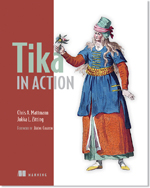Supported Document Formats
This page lists all the document formats supported by Apache Tika.
Microsoft's OLE 2 Compound Document format
A number of Microsoft applications, most notably the Microsoft Office suite, use the generic OLE 2 Compound Document format as the basis of their document formats. Tika uses Apache POI to support a number of these formats.
The OLE2 Compound Document format is designed for use with random access files, and so the input stream passed to a Tika parser needs to be spooled in memory or in a temporary file depending on the size of the document. See TIKA-153 for an effort to avoid this extra temporary file if the input document already comes from a file.
In addition to the shared base format there's also a shared sets of metadata in typical OLE2 documents. Tika uses the HPSF library from POI to parse these property sets and exposes them as the following document metadata:
- TITLE Title
- SUBJECT Subject
- AUTHOR Author
- KEYWORDS Keywords
- COMMENTS Comments
- TEMPLATE Template
- LAST_SAVED Last Saved By
- REVISION_NUMBER Revision Number
- LAST_PRINTED Last Printed
- LAST_SAVED Last Saved Time/Date
- LAST_SAVED Last Saved Time/Date
- PAGE_COUNT Number of Pages
- WORD_COUNT Number of Words
- CHARACTER_COUNT Number of Characters
- APPLICATION_NAME Name of Creating Application
Note that in practice the metadata in many documents is either missing, incomplete or even incorrect, so a client application should not rely too much on this information.
Support for the new Office Open XML format used by Microsoft Office version 2007 is pending for a POI upgrade. Current status is recorded in TIKA-152.
The generic OLE2 Compound Document format is automatically detected using a magic number, and further parsing can automatically determine the more specific document format. Tika also knows a number of common glob patterns like *.doc and *.ppt for these formats.
The supported OLE 2 Compound Document formats are:
- Microsoft Excel (application/vnd.ms-excel)
- Excel spreadsheet support is available in all versions of Tika and is based on the HSSF library from POI.
The Excel parser in Tika uses the HSSF event API and is able to extract much of the document structure, including all (non-empty) worksheets and their table structures. Formula results are extracted as stored in the Excel file, and cell links are exposed as XHTML links. These features were added in Tika version 0.2.
Cell comments and formatting are currently not supported. See TIKA-148 and TIKA-103 for the respective issues.
- Microsoft Word (application/msword)
- Word document support is available in all versions of Tika and is based on the HWPF library from POI.
The Word parser uses the WordExtractor class from HWPF to extract document content as a sequence of paragraphs.
- Microsoft PowerPoint (application/vnd.ms-powerpoint)
- PowerPoint presentation support is available in all versions of Tika and is based on the HSLF library from POI.
The PowerPoint parser uses the PowerPointExtractor class from HSLF to extract spreadsheet content as a single paragraph.
- Microsoft Visio (application/vnd.visio)
- Visio diagram support was added in Tika version 0.2 and is based on the HDGF library from POI.
The Visio parser uses the VisioExtractor class from HDGF to extract diagram content as a sequence of paragraphs.
- Microsoft Outlook (application/vnd.ms-outlook)
- Outlook message support was added in Tika version 0.2 and is based on the HSMF library from POI.
The Outlook parser extracts the subject of the message and the From, To, Cc, and Bcc addresses (formatted for display) along with the body text of text/plain messages. The AUTHOR, TITLE and SUBJECT metadata properties are set explicitly, overriding potential generic document metadata retrieved from OLE2 property sets.
Compression formats
General purpose compression formats are used to reduce the size of any kinds of documents. Tika uses a parsing pipeline to support general purpose compression: in the first stage the compressed stream decompressed and the resulting decompressed stream is passed on to a second parsing stage where it will be processed as if the document had never been compressed.
Tika contains magic numbers and glob patterns for auto-detecting all supported compression formats. The glob patterns of compression formats are also used to determine the name of the original uncompressed document. If a client application has supplied a RESOURCE_NAME_KEY metadata property that matches such a glob pattern, then the decompressing first parsing stage will replace the RESOURCE_NAME_KEY metadata property with the deduced original document name before passing control to the second parsing stage.
Note that apart from the special handling of the RESOURCE_NAME_KEY property, no document metadata is passed to or from the second parsing stage. Only the text content extracted by the second stage parser is returned to the client application.
The supported compression formats are:
- gzip compression (application/x-gzip)
- Gzip support was added in Tika version 0.2 and is based on the GZIPInputStream class in the Java 5 class library.
The known gzip glob patterns are *.tgz, *.gz and *-gz, and they will respectively be replaced with *.tar, * and * as described above.
- bzip2 compression (application/x-bzip)
- Bzip2 support was added in Tika version 0.2 and is based on bzip2 parsing code from Apache Ant, which in turn was originally based on work by Keiron Liddle from Aftex Software.
The known bzip2 glob patterns are *.tbz, *.tbz2, *.bz and *.bz2, and they will respectively be replaced with *.tar, *.tar, * and * as described above.
Audio formats
Tika can detect several common audio formats and extract metadata from them. Text extraction is supported for some MIDI-based karaoke formats that contain the lyrics of the encoded audio.
See TIKA-94 for an effort to integrate speech recognition support to Tika.
- MP3 Audio (audio/mpeg)
- The parsing of ID3v1 tags from MP3 files was added in Tika version 0.2. If found the following metadata is extracted and set:
- TITLE Title
- SUBJECT Subject
The above information, as well as the Album, Track, Year, Genre and additional Comment are extracted when set in the file.
- MIDI audio (audio/midi)
- Tika uses the MIDI support in javax.audio.midi to parse MIDI sequence files. Many karaoke file formats are based on MIDI, and contain lyrics as embedded text tracks that Tika knows how to extract.
Support for MIDI files was added in Tika 0.3.
- Wave audio (audio/basic)
- Tika supports sampled wave audio (.wav files, etc.) using the javax.audio.sampled package. Only sampling metadata is extracted.
Support for sampled wave audio was added in Tika 0.3.
Other supported formats
- Extensible Markup Language (application/xml)
- Tika uses the javax.xml classes to parse Extensible Markup Language files. Support for Extensible Markup Language files was added in Tika 0.1.
- HyperText Markup Language (text/html)
- Tika uses the CyberNeko library to parse HyperText Markup Language files. Support for HyperText Markup Language files was added in Tika 0.1.
- Images (image/*)
- Tika uses the javax.imageio classes to extract metadata from image files.
Support for Image files was added in Tika 0.2.
- Java class files
- The parsing of Java Class files is based on the asm library and work by Dave Brosius in JCR-1522.
Support for Java Class files was added in Tika 0.2.
- Java jar archives
- The parsing of Java JAR archives is performed using a combination of the ZIP and Java class file parsers.
Support for Java JAR archives was added in Tika 0.2.
- OpenDocument (application/vnd.oasis.opendocument.*)
- Tika uses the built-in ZIP and XML features in Java to parse the OpenDocument document types used most notably by OpenOffice 2.0 and higher. The older OpenOffice 1.0 formats are also supported, though they are currently not auto-detected as well as the newer formats.
Support for the OpenDocument formats was added in Tika 0.3.
- Plain text (text/plain)
- Tika uses the International Components for Unicode Java library (ICU4J) to parse plain text. Support for plain text was added in Tika 0.1.
Extracting text content from plain text files is actually a relatively complex task due to the fact that the character encoding of the text file is often unknown to the parser.
The text parser in Tika uses the ICU4J CharsetDetector class to automatically detect the character encoding of any text input. As an added benefit, the ICU4J library is in some cases able to detect also the language in which the text is written.
The character encoding and language of the plain text document are returned as the Metadata.CONTENT_ENCODING and Metadata.LANGUAGE metadata properties. If the (declared) content encoding of a text document is already known to the client application, then it can be supplied as the Metadata.CONTENT_ENCODING metadata property to the parser to simplify encoding detection.
- Portable Document Format (application/pdf)
- Tika uses the PDFBox library to parse Portable Document Format (PDF) documents.
Support for PDF was added in Tika 0.1.
- Rich Text Format (application/rtf)
- Tika uses Java's built-in Swing library to parse Rich Text Format (RTF) documents. Support for RTF was added in Tika 0.1.
The RTF parser in Tika uses the Swing RTFEditorKit class to extract all text from an RTF document as a single paragraph. Document metadata extraction is currently not supported.
- tar archive (application/x-tar)
- Tika uses an adapted version of the tar parsing code from Apache Ant to parse tar archives. The tar code is originally based on work by Timothy Gerard Endres.
Support for tar archives was added in Tika 0.2.
- ZIP archive (application/zip)
- Tika uses Java's built-in Zip classes to parse ZIP files.
Support for ZIP was added in Tika 0.2.


